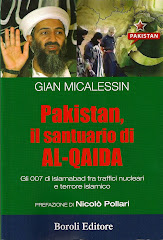Enduring army role in Swat spurs questions about Pakistan's civilian government
By Karin Brulliard
Friday, April 2, 2010; A08
MINGORA, PAKISTAN -- Officially, the military operation to purge the Taliban from Pakistan's Swat Valley ended last summer. But even as life in the lush region returns to normal, the army's footprint is everywhere.
The military is rebuilding roads, schools and libraries. It is buying computers for women's vocational institutes and solar-powered streetlights for villages. It is planting a million trees. The work has made soldiers hugely popular, but some wonder why the civilian government is not doing it.
"The mandate of the army was to clear the area and to hold the area for peace. To build should be done by the civilians," said Zia ud-Din, an educator and spokesman for the Swat National Committee, a civil society group. "How long will we depend on them?"
There are competing explanations for why the military remains in the lead. Some U.S. and Pakistani military officials say Pakistan's anemic civilian government is too corrupt and bureaucratic to build on military progress by improving services and quality of life. Others say the military is too accustomed to control and too enthralled with its popularity to cede any power.
Pakistani officials say their objective is to prevent the rebels from regaining a foothold. Pakistan's successes over the past year in battling Islamist fighters in Swat and in the remote tribal area of South Waziristan have won the country high praise from U.S. officials. But at the same time, some American and Pakistani experts say the enduring military presence carries worrying implications, because it ties down forces needed to battle militants elsewhere and raises awkward questions about the country's efforts to emerge from a decade of military rule.
"They are carrying guns at the same time they are carrying shovels. It's sending the wrong signals," said Rifaat Hussain, a defense and security studies professor in Islamabad. "The civilians are completely dependent on the army."
To be sure, government offices in Swat are open, and they have reclaimed their chaotic bustle. Naeem Akhtar, a top civilian administrator, said officials have reduced a large backlog of court cases, surveyed 10,000 destroyed houses and shops, and plan to distribute $1 million in total compensation to families of victims or survivors of terrorist attacks.
"In the entire district, every nook and corner, the government is functioning," Akhtar said.
But security analysts say that keeping insurgents at bay requires the government not just to resume its functions but to improve them -- and that is the worry.
Outside the government complex on a recent day, Ehsan Ullah paced with a folder full of documents. He was injured in a bombing in February 2009, he said, and had spent months submitting paperwork for compensation, only to be shuffled from one office to another.
"Corruption, corruption, corruption, corruption, corruption," fumed the young man, waving a cellphone that he said he planned to sell that day to feed his family.
Usurping authority?
Of 401 schools bombed by militants or left dilapidated, half have been rebuilt. But it was the military, not the government, that rebuilt them while also providing temporary tents for other schools. By some estimates, the army has carried out 90 percent of the building and rebuilding projects -- a list so long that it took 20 minutes for Lt. Col. Akhtar Abbas, an army spokesman in the region, to recite.
The army has also set up mobile clinics in rural areas that have no government hospitals. At the occasional checkpoints in the valley, soldiers stand alongside police officers, and the army is working to enroll and train police recruits. With 50,000 soldiers in Swat, the military presence there is now larger than it was during the offensive.
The military says it will leave Swat when the provincial government asks. Ud-Din, the activist, said the continuing troop presence has created tensions, with provincial workers complaining privately that the army has usurped authority by "putting their noses into everything," in an effort to create dependency.
In South Waziristan, officials say they are prioritizing a rapid buildup of civilian institutions. Tariq Hayat Khan, the law and order secretary for the tribal areas, said the federal government had pledged -- though not yet fully delivered -- millions of dollars for a post-operation plan to prevent residents from "being mercenaries for the miscreants." It includes vocational schools, a buildup of community police and road construction.
But in both Swat and South Waziristan, there also appears to be widely felt apprehension about too quick a military drawdown. In the hectic city of Mingora, civil officials say the army is providing much-needed security and carrying out reconstruction projects that could not otherwise be funded. A senior Pakistani military official, for his part, was disparaging about his civilian partners. "Whenever we give them the job, they're not capable of doing it because of corruption," he said, speaking on the condition of anonymity to discuss the matter frankly.
"They completed this in two months," Mohammed Saeed, a principal in the village of Shamozai, said of the military's reconstruction of his school and renovation of its furniture. "I think if it had been done by the government, it would have taken 10 years.
Iscriviti a:
Commenti sul post (Atom)



Nessun commento:
Posta un commento